实用英语写作教程(16)
- 格式:pdf
- 大小:1.82 MB
- 文档页数:10
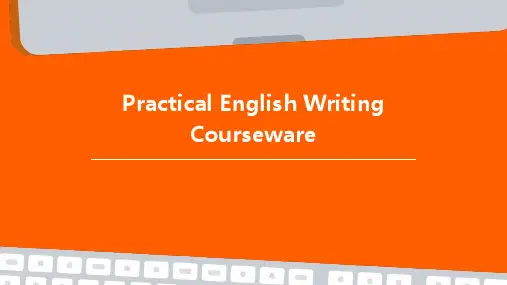
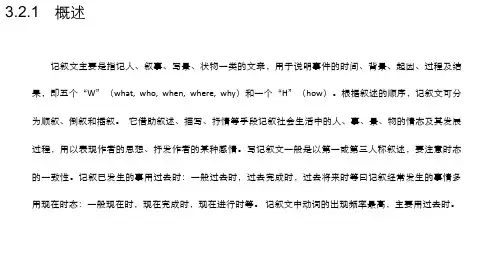

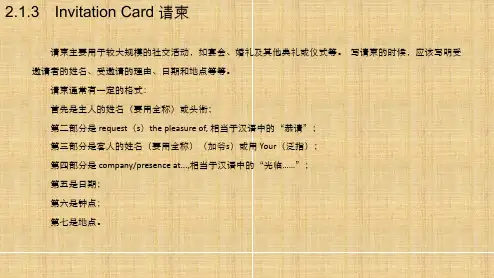
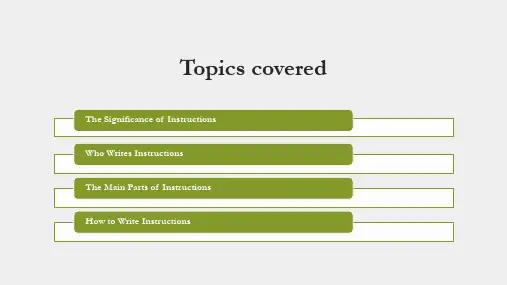
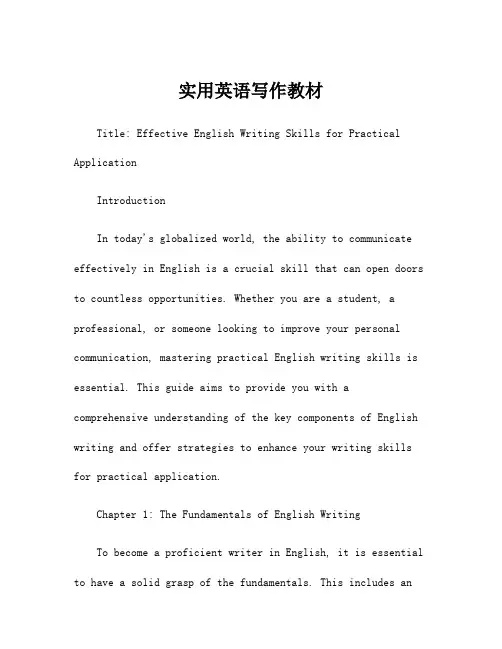
实用英语写作教材Title: Effective English Writing Skills for Practical ApplicationIntroductionIn today's globalized world, the ability to communicate effectively in English is a crucial skill that can open doors to countless opportunities. Whether you are a student, a professional, or someone looking to improve your personal communication, mastering practical English writing skills is essential. This guide aims to provide you with a comprehensive understanding of the key components of English writing and offer strategies to enhance your writing skills for practical application.Chapter 1: The Fundamentals of English WritingTo become a proficient writer in English, it is essential to have a solid grasp of the fundamentals. This includes anunderstanding of grammar, sentence structure, vocabulary, and punctuation.1.1 GrammarGrammar is the set of rules that govern the structure of sentences, phrases, and words in English. Mastering grammaris crucial as it ensures that your writing is clear, coherent, and easy to understand. Some key areas to focus on include subject-verb agreement, tense consistency, and proper use of articles.1.2 Sentence StructureVarying your sentence structure can make your writingmore engaging and interesting to read. Simple sentencesconsist of a subject, verb, and object. Compound sentencesjoin two or more independent clauses using coordinating conjunctions like 'and,' 'but,' or 'or.' Complex sentences include one or more dependent clauses introduced bysubordinating conjunctions such as 'because,' 'although,' or'since.'1.3 VocabularyA rich vocabulary allows you to express your ideas more precisely and vividly. To expand your vocabulary, read widely, use a dictionary to look up unfamiliar words, and practice using new words in your writing.1.4 PunctuationPunctuation helps to organize your thoughts and clarify your meaning. Common punctuation marks include periods, commas, apostrophes, colons, and semicolons. Each mark has a specific function and should be used appropriately to ensure clear communication.Chapter 2: Planning and Organizing Your WritingBefore you begin writing, it is important to plan and organize your ideas. This will help you to write with clarity and coherence.2.1 BrainstormingBrainstorming is a technique used to generate ideas and stimulate creativity. You can brainstorm by jotting down any thoughts that come to mind related to your topic, without worrying about their relevance or order.2.2 OutliningOutlining involves creating a framework for your writing by organizing your ideas into main points and supporting details. This can be done in a traditional outline format or in a more flexible mind map.2.3 Thesis StatementYour thesis statement is a clear, concise statement that summarizes the main point or argument of your writing. Itshould be included in your introduction and serve as a guide for the rest of your text.Chapter 3: Writing Techniques for Clarity and Coherence Once you have planned your writing, it is time to focus on the techniques that will make your text clear and easy to follow.3.1 Paragraph StructureA well-structured paragraph typically includes a topic sentence, supporting sentences, and a concluding sentence. The topic sentence introduces the main idea of the paragraph, while the supporting sentences provide evidence or elaboration. The concluding sentence summarizes the paragraph's main point or transitions to the next paragraph.3.2 Cohesive DevicesCohesive devices are words or phrases that connect ideas within and between paragraphs. They include transitionalwords (e.g., 'however,' 'therefore'), pronouns (e.g., 'it,' 'they'), and conjunctions (e.g., 'and,' 'but'). Using cohesive devices effectively can improve the flow and comprehensibility of your writing.3.3 Editing and RevisingEditing and revising are essential steps in the writing process. Editing involves checking for errors in grammar, spelling, and punctuation. Revising involves reevaluating the content and structure of your writing to ensure that your message is clear and effective. It may involve adding or deleting information, reorganizing paragraphs, or refining your thesis statement.Chapter 4: Advanced Writing StrategiesAs you become more comfortable with the basics of English writing, you can start to explore more advanced strategies to enhance your writing skills.4.1 Rhetorical DevicesRhetorical devices are techniques used to create a powerful impact on your reader. Examples include metaphors, similes, alliteration, and personification. These devices can add depth and interest to your writing, making it more memorable and persuasive.4.2 Tone and StyleThe tone of your writing reflects the attitude you take toward your subject and your audience. It can range from formal to informal, serious to humorous. Your style is the way you express yourself through your writing, including your word choice, sentence length, and organization. Being aware of your tone and style allows you to tailor your writing to suit different contexts and purposes.4.3 Persuasive WritingPersuasive writing aims to convince the reader to accept a particular viewpoint or take a specific action. To write persuasively, you need to present compelling arguments supported by evidence, address counterarguments, and use emotional appeals when appropriate.ConclusionMastering practical English writing skills is a journey that requires dedication, practice, and an understanding of the key principles outlined in this guide. By focusing on the fundamentals of grammar, sentence structure, vocabulary, and punctuation, and by planning and organizing your writing with clarity and coherence, you can develop your writing skills to a high level. Additionally, by incorporating advanced strategies such as rhetorical devices, adjusting your tone and style, and learning persuasive techniques, you canfurther enhance your writing and adapt it to various contexts and purposes. Remember, practice makes perfect, so continueto write regularly and seek feedback to refine your skills. With commitment and effort, you can become a highly skilled and effective English writer.。
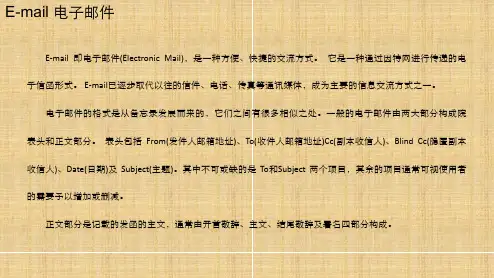
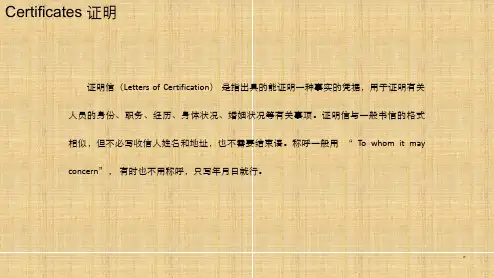
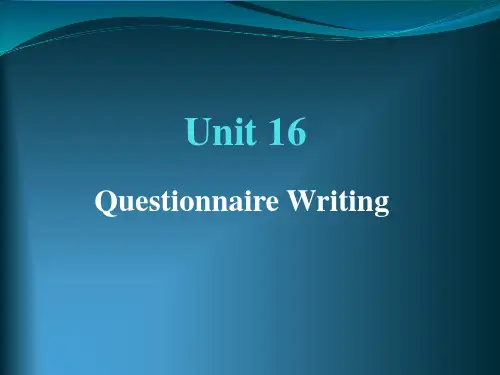

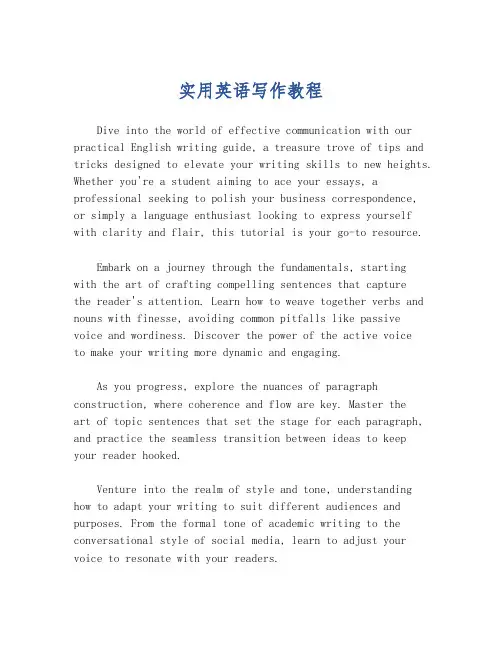
实用英语写作教程Dive into the world of effective communication with our practical English writing guide, a treasure trove of tips and tricks designed to elevate your writing skills to new heights. Whether you're a student aiming to ace your essays, a professional seeking to polish your business correspondence,or simply a language enthusiast looking to express yourself with clarity and flair, this tutorial is your go-to resource.Embark on a journey through the fundamentals, startingwith the art of crafting compelling sentences that capturethe reader's attention. Learn how to weave together verbs and nouns with finesse, avoiding common pitfalls like passivevoice and wordiness. Discover the power of the active voiceto make your writing more dynamic and engaging.As you progress, explore the nuances of paragraph construction, where coherence and flow are key. Master theart of topic sentences that set the stage for each paragraph, and practice the seamless transition between ideas to keepyour reader hooked.Venture into the realm of style and tone, understanding how to adapt your writing to suit different audiences and purposes. From the formal tone of academic writing to the conversational style of social media, learn to adjust your voice to resonate with your readers.Our guide doesn't stop there; it also delves into the intricacies of grammar, punctuation, and spelling, ensuring that your writing is not only impactful but also error-free. With exercises and examples to practice what you've learned, you'll be well-equipped to tackle any writing challenge that comes your way.So, are you ready to transform your writing from ordinary to extraordinary? Let's get started on this enlightening adventure that promises to unlock your full potential as a writer.。
新时代核心英语教程写作2答案unit16课后习题答案1、I paint a lot of pictures. [单选题] *A. 评论B. 注意C. 悬挂D. 画(正确答案)2、Julia’s on holiday in Shanghai _______. [单选题] *A. in a momentB. after a momentC. at the moment(正确答案)D. at any moment3、75.Why not________ for a walk? [单选题] *A.go out(正确答案)B.to go outC.going outD.goes out4、We had a(an)_____with him about this problem last night. [单选题] *A.explanationB.impressionC.exhibitionD.discussion(正确答案)5、The reason I didn't attend the lecture was simply _____ I got a bad cold that day. [单选题] *A. becauseB. asC. that(正确答案)D. for6、—Mum, could you buy a schoolbag ______ me when you go shopping?—No problem.()[单选题] *A. ofB. toC. inD. for(正确答案)7、I have worked all day. I'm so tired that I need _____ . [单选题] *A. a night restB. rest of nightC. a night's rest(正确答案)D. a rest of night8、How many subjects are you _______ this year? [单选题] *A. takesB. takeC. taking(正确答案)D. took9、The manager demanded that all employees _____ on time. [单选题] *A. be(正确答案)B. areC. to beD. would be10、What’s your _______ for the coming new year? [单选题] *A. playB. plantC. plan(正确答案)D. plans11、We _______ play basketball after school. [单选题] *A. were used toB. used to(正确答案)C. use toD. are used to12、Don’t ______. He is OK. [单选题] *A. worriedB. worry(正确答案)C. worried aboutD. worry about13、Words are windows()you can look into the past. [单选题] *A. through which(正确答案)B. through thatC. whichD. whose14、( )Keep quiet, please. It’s ________ noisy here. [单选题] *A. many tooB. too manyC. too muchD. much too(正确答案)15、_____ of the land in this area _____ covered with forest. [单选题] *A. Two-fifth; isB. Two fifth; areC. Two fifths; is(正确答案)D. Two fifths; are16、—______?—He can do kung fu.()[单选题] *A. What does Eric likeB. Can Eric do kung fuC. What can Eric do(正确答案)D. Does Eric like kung fu17、( ) .Would you please ______me the gifts from your friends? [单选题] *A.to showB. showingC. show(正确答案)D. shown18、Tomorrow is Ann’s birthday. Her mother is going to make a _______ meal for her. [单选题] *A. commonB. quickC. special(正确答案)D. simple19、In the past, Mary _______ listening to music in her spare time. [单选题] *A. will likeB. likesC. likeD. liked(正确答案)20、_____ of the teachers in this district are women teachers. [单选题] *A. Four fifthB. Four fifths(正确答案)C. Fourth fifthsD. Four five21、I want something to eat. Please give me a _______. [单选题] *A. bookB. watchC. shirtD. cake(正确答案)22、Mary is interested ______ hiking. [单选题] *A. onB. byC. in(正确答案)D. at23、Which do you enjoy to spend your weekend, fishing or shopping? [单选题] *China'shigh-speed railways _________ from 9,000 to 25,000 kilometers in the past fewyears.A. are growing(正确答案)B. have grownC. will growD. had grown24、Although the story is written for children, it can be read by adult, _____. [单选题] *A. alsoB. eitherC. as wellD. too(正确答案)25、Grandfather lives with us. We all _______ him when he gets ill. [单选题] *A. look after(正确答案)B. look atC. look forD. look like26、My brother is too shy. He _______ speaks in front of lots of people. [单选题] *A. alwaysB. usuallyC. seldom(正确答案)D. sometimes27、Jack would rather spend time complaining than_____the problem by himself. [单选题] *A.solve(正确答案)B.solvedC.solvesD.to solve28、The Spring Festival is on the way.Many shops have _______ huge posters with the word sales. [单选题] *A. put up(正确答案)B. put onC. put outD. put off29、You might not like the way Sam behaves, but please be kind to him. _____, he is your grandfather. [单选题] *A. After all(正确答案)B. Above allC. In allD. At all30、You could hardly imagine _______ amazing the Great Wall was. [单选题] *A. how(正确答案)B. whatC. whyD. where。
Lesson 16 Minutes (会议记录)Key to ExercisesPractice 1Complete the following chart with the information given in the samples.Practice 2Read the following minutes and fill in the chart below. Write Y in the box if the item is mentioned in the minutes and N if it is not mentioned.Practice 3Correct any errors in number usage in the following sentences by writing the correction to the left of the sentence. If the sentence is correct, mark C on the line to the left.1. 351 (Three hundred and fifty-one) people attended the performance.C 2. There were 135 pieces in the puzzle.3. Class started at eight-thirty (8:30 a.m.) in Room 20.4. In the sixties there were sit-ins at 100’s (hundreds) of colleges.C 5. Every afternoo n at two o’clock the chimes rang.6. The stock deal, which involved $4.5 billion, paid a twelve and a half percent (12.5%) dividends.7. The Hong Kong Phoenix TV station is Channel Eighteen (18).8. They needed 8 (eight) 10-foot poles for the construction.9. The vote was 126 in favor of the action and only sixteen (16) opposed.10. Only fifty percent (About 50%) of high school students go on to college.Practice 4Give the abbreviation form of the following words in the chart. The first one is done for you.Practice 5Choose proper head for each part of the following minutes.Practice 6Complete the following minutes according to the Chinese in the parentheses.Practice 8Choose the best topic sentence for each topic from the three choices below.1. Topic: types of loans for businessa. There are various kinds of loans available to the business owners.b. Business owners often need loans of different types.c. Franchise loans are those business loans which are given by franchise companies.2. Topic: brand value growtha. Some of the brands such as Hair and Legend are of great value and widelyrecognized in the world.b. Brand value is important for most companies.c. A more open and competitive environment is vital for brand value growth.3. Topic: different traditional treatments in the USa. One traditional treatment people in the US often use is massage.b. People in the US often go to nutritionists for treatments.c. Many people in the US are using traditional treatments instead of modernmedicine to treat a variety of problems.4. Topic: Exxon Mobile Corporationa. Exxon Mobile is a petroleum company.b. Exxon Mobile is one of the world’s largest companies when measured byrevenue and market capitalization.c. Exxon Mobile was founded on November 30, 1999.5. Topic: the role of team leadershipa. In an organization characterized by excellent leadership, employees will looktowards the leaders for a number of things.b. Employees can have great faith in the abilities of leaders with good leadership.c. During drastic change times, employees will expect effective planning from theirleader.Practice 9Read the following passages and underline the topic sentences in the passages.1. This week the Japanese Government embarks on an ambitious scheme to reinvent the appearance of Japanese businessman. Cool and casual dresses instead of formal suits and ties are advocated at offices in hot months so as to save energy by setting their air-conditioners for a higher temperature. The scheme is initiated by fashion designers, famous department stores and even the former Prime Minister himself.2. The idea behind the initiative—named with “Cool Biz”—is simple and serious. Japan is lamentably behind in reaching its targets for reduction of ozone-depleting gases, despite hosting the 1997 Kyoto Conference at which they were set. The stated goal is to reduce 1990 levels by 6% by the year 2012. But in 2003, emissions were up by 8% on the base year.3. In May 1985, Coca-Cola chairman Robert Goizueta announced one of the boldest gambles in marketing history: Coca-Cola would make a significant flavor change in Coke, the world’s best-selling soft drink. The 99-year-old formula would be modified. Coca-Cola introduced “New Coke”in an attempt to win back market share from Pepsi. Supermarket sales of Coke had slipped behind Pepsi by almost 2%, and Pepsi was consistently winning blind taste tests.4. During the first month of New Coke introduction, shipments to Coke bottlers set a record, and more people tried the new product than had ever sampled any new product. However, the entire picture changed suddenly. Consumers began todemand the old Coke. Sales were dropping rapidly. There was even talk of a class-action suit by a Seattle-based organization, Old Coke Drinkers of America. Coca-Cola headquarters received thousands of protest letters. Coca-Cola bottlers meeting in Dallas signed a petition demanding that the company restore the traditional formula.5. The key to successful budgeting is both flexibility and inflexibility. Certain expenses are fixed, so payment of those bills should be an inflexible element. Nothing is more important than paying those particular bills in full. In business, departments need to know the absolute ceiling on spending. Budgeting works best when very few exceptions are made to the upper limits. The idea of fiscal responsibility is to form a workable budget and stick to it as well as possible.。